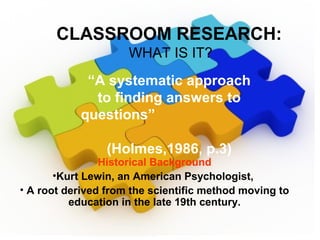Classroom research
•
0 likes•219 views
Classroom research is a systematic approach to answering questions about teaching and learning. It can involve various types of data collection to analyze needs, improve instruction, and better understand students. The document argues that designing course syllabi and developing reflective teaching practices through classroom research helps teachers improve learning environments and student understanding while also making classrooms more engaging for language acquisition and social interaction. Conducting classroom research through daily questioning and note-taking on what works with different student groups is important for addressing problems teachers face.
Report
Share
Report
Share

Recommended
More Related Content
What's hot
What's hot (15)
Difference between academic disciplines and subjects

Difference between academic disciplines and subjects
Similar to Classroom research
Similar to Classroom research (20)
MODUEL 2 THE TEACHER AS A KNOWER OF THE CURRICULUM.pptx

MODUEL 2 THE TEACHER AS A KNOWER OF THE CURRICULUM.pptx
Curriculum Development: Concepts, Nature and Purposes of Curriculum

Curriculum Development: Concepts, Nature and Purposes of Curriculum
Li (Jerry) Xie Dimensions of Diversity Capstone Project

Li (Jerry) Xie Dimensions of Diversity Capstone Project
Li (Jerry) Xie Dimensions of Diversity_ Capstone Project.pptx

Li (Jerry) Xie Dimensions of Diversity_ Capstone Project.pptx
Recently uploaded
Mehran University Newsletter is a Quarterly Publication from Public Relations OfficeMehran University Newsletter Vol-X, Issue-I, 2024

Mehran University Newsletter Vol-X, Issue-I, 2024Mehran University of Engineering & Technology, Jamshoro
God is a creative God Gen 1:1. All that He created was “good”, could also be translated “beautiful”. God created man in His own image Gen 1:27. Maths helps us discover the beauty that God has created in His world and, in turn, create beautiful designs to serve and enrich the lives of others.
Explore beautiful and ugly buildings. Mathematics helps us create beautiful d...

Explore beautiful and ugly buildings. Mathematics helps us create beautiful d...christianmathematics
This presentation was provided by William Mattingly of the Smithsonian Institution, during the third segment of the NISO training series "AI & Prompt Design." Session Three: Beginning Conversations, was held on April 18, 2024.Mattingly "AI & Prompt Design: The Basics of Prompt Design"

Mattingly "AI & Prompt Design: The Basics of Prompt Design"National Information Standards Organization (NISO)
Recently uploaded (20)
Explore beautiful and ugly buildings. Mathematics helps us create beautiful d...

Explore beautiful and ugly buildings. Mathematics helps us create beautiful d...
ICT Role in 21st Century Education & its Challenges.pptx

ICT Role in 21st Century Education & its Challenges.pptx
Presentation by Andreas Schleicher Tackling the School Absenteeism Crisis 30 ...

Presentation by Andreas Schleicher Tackling the School Absenteeism Crisis 30 ...
Mattingly "AI & Prompt Design: The Basics of Prompt Design"

Mattingly "AI & Prompt Design: The Basics of Prompt Design"
Classroom research
- 1. Historical Background •Kurt Lewin, an American Psychologist, • A root derived from the scientific method moving to education in the late 19th century. CLASSROOM RESEARCH: WHAT IS IT? “A systematic approach to finding answers to questions” (Holmes,1986, p.3)
- 3. Classroom research can be:
- 4. INSTRUMENTS OF A CLASSROOM RESEARCH
- 5. Needs analysis within classroom research
- 6. GROUP’S CONCLUSION A teacher is running classroom research every time h/she is thinking of designing a syllabus for a specific course because the data collection instruments should be used to focus on questions related to who the learners are, why the learners are taking the course, how they learn, what resources are available, and where and when the ESP course will take place. A teacher is running classroom research every time h/she is thinking of designing a syllabus for a specific course because the data collection instruments should be used to focus on questions related to who the learners are, why the learners are taking the course, how they learn, what resources are available, and where and when the ESP course will take place. It is necessary that we as teachers develop reflective teaching practices, which help us to understand the students better as well as to improve the language learning environment and the view of education through conducting research in our own classroom. It is necessary that we as teachers develop reflective teaching practices, which help us to understand the students better as well as to improve the language learning environment and the view of education through conducting research in our own classroom. Classrooms must be the setting for students to get involved in English learning and social interaction. That is why, classroom research is an excellent opportunity to reach this goal. It is necessary that we ask questions every day about the problem we face, and take notes about what works and does not with each group of students.
- 7. REFERENCE /FURTHER READING • Allwright, D. & Bailey, K. (1991). Focus on the language classroom: An introduction to classroom research for language teachers. Cambridge University Press. • Chaudron, C. (1988). Second Language Classrooms, Cambridge: Cambridge University Press. • Collins, H. (1992). Wide scope analysis: Requirements and feasibility. Study funded by the Fundacao de Amparo a Pesquisa do Estado de Sao Paulo, Brasil.whole document. • Holmes, J. (1986). The teacher as researcher. Sao Paulo: Pontificia Universidad de Católica de Sao Paulo. • Hutchinson, T. & Waters, A. (1987). English for Specific Purposes. Cambridge: Cambridge University PressAllwright, D. (1996). Observation in the language classroom. London: Longman. •